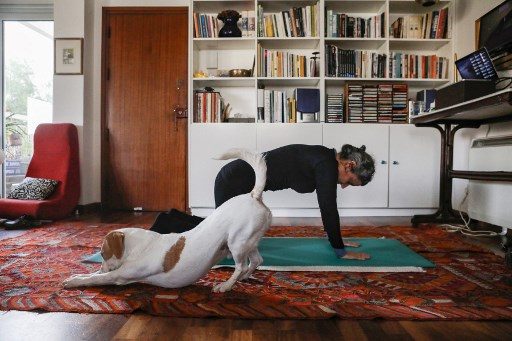SUMMARY
This is AI generated summarization, which may have errors. For context, always refer to the full article.

MANILA, Philippines – The lockdown can be as difficult and stressful for your pets as it is for you.
We spoke with four experts to find out what you can and should do to make sure your pets are okay during the enhanced community quarantine over Luzon and other parts of the Philippines.
Marga Carpio, DVM
Vets in Practice
“Staying indoors during the lockdown can be just as stressful for pets. The change in their routine—no more daily walks and visits from regular guests—can contribute to stress and boredom. During these uncertain times, when staying healthy is of utmost importance, owners should find creative ways to keep their pets preoccupied,” Carpio says.
- Physical Exercise – You can play catch with your pet, make them go through makeshift obstacles, or let them run around in the garden or within the house perimeter on a leash.
- Mental Stimulation – They’re never really too old to learn new tricks. And now’s a great time to teach them some new ones.
- Lessen food intake by 10% – Since they won’t be able to burn the calories, you can cut down on their food servings or try a low-fat diet. Without exercise, a high-protein diet can make your pet hyper and affect their temperament, so opt for a moderate-protein diet instead.
- Have lots of water available.
- Prepare your pet grab bag** – Have a Pet Evacuation Plan (PEP). With my experience on the ground during the Taal Volcano eruption, I learned that having a PEP is crucial in insuring pet and human safety. Without one, people kept going back to their homes, facing danger, even if they were told to evacuate.
- Make or buy a pet first aid kit – Make use of the time you have to prepare one for your pets. (Vets In Practice will be selling pet first aid kits soon.)
** Essentials:
Pet cage/carrier per pet
Leash and collar with ID
Copy of health certificate
Canned dog food
Bottled water
Food and water bowl
All Vets in Practice branches are closed due to the enhanced community quarantine, but for updates you can follow their official Facebook, YouTube, and Instagram accounts. In the meantime their veterinarians will be conducting online consultations via their Facebook page.
Elsie Louise Pfleider, CPDT-KSA, LSHC-S, Training Director
Betterdog Canine Behavior Center
- Structure your day -This goes for both you and your dog. Be clear about it. Stick to it. A structured day is a good antidote against cabin fever.
- Potty train your dog – Now that you really have all the time to focus on the task. Here’s a tutorial on how to do it.
- Teach your dog a trick a week – And journal your progress on IG.
- Don’t let your dog get fat. No freebies. Feed your dog only half his portion every meal. Feed the other half by hand, as a reward when training, and as random rewards for each good behavior throughout the day.
- Reward desirable choices with the good stuff – Make this your project: First, create really yummy homemade treats for your dog. Then reward any display of good behavior with the treats you just prepared. (If you still have treats left at the end of the week, you probably weren’t looking hard enough.) Undesirable behaviors tend to wither away when you don’t reward them. (Here’s a secret: If the undesirable behavior persists, you may inadvertently be rewarding your dog for it. Put on your detective cap and try to figure out what it is you’re rewarding your dog’s behavior with. Is it treats, attention, toys, or playtime?)
- Avoid taking your dog outside. This might expose you to a COVID-19 carrier and put you at risk.
- Stock up on dog food and necessary maintenance medicines and treatments your dog will need. That includes anti-flea/tick treatments, and heartworm preventive and intestinal deworming medications.
- Keep in touch with your veterinarian. Most matters can be dealt with over the phone and will not require you to bring your dog to the clinic. And, thankfully, electronic prescriptions are now allowed.
Mary Rose J. Magpily, DVM, DipCBST
Pet Centrics Dog Training and Behavior Consultation
- Stock up on pet food, medication and other basic supplies. Make sure you have enough pet food to last for at least a few weeks, and also include first aid supplies and grooming materials in your list of things to stock up on. Being reasonably well supplied will minimize your need to go outside for a pet supply run. But make sure you leave something for the other pet parents out there – DO NOT HOARD.
- Clean your pet often, especially after spending time outside. If your pet spends time outside in public places, be sure to clean them well before letting them back in the house. Wipe them down with a clean, wet towel to remove dust and debris. Then use baby wipes or other pet-friendly sanitizing solution to wipe down your pet a second time. Consider increasing the frequency of your pet’s baths if you often go for walks outside.
- Keep your pet well-groomed. For dogs that need their hair trimmed, you may need to learn to do this yourself for now, since grooming services may be inaccessible. Be extremely careful when using grooming equipment on your dog to avoid injury to yourself and to your pet, and do not proceed if you are not confident about handling your pet yourself.
- Provide your pet with mental and physical stimulation. Keep your dog engaged in mentally and physically stimulating activities. Now is the best time to teach your pet a new trick or to review his basic obedience training. Walk your dog if it is possible for you to do so but be sure to steer clear of crowded, busy streets. Play games that are suitable for indoor spaces if going outside is not possible for you. Hiding toys or food for your pet to find around the house is one way to keep him and you entertained.
- Keep an eye on your pet’s health. Check your pet’s vaccination record to see if your pet’s vaccines are up to date or if anything is due for a boost soon. Give your vet a call to ask if these vaccinations are urgently needed or if you can postpone them to a later time. Occasionally, give your pet a basic physical exam to check ears, eyes, mouth, teeth, coat, etc. Don’t rush to the vet if you notice anything right off. Opt for a phone or video consult first to let a vet assess if a vet clinic visit is necessary. Some minor concerns may be addressed effectively via phone or video consult.
- Know where to take your pet in case of veterinary medical emergencies. Keep a list of veterinary clinics and their contact numbers at hand in case of emergencies.
While under enhanced community quarantine, Magpily will be providing by-appointment-only teleconsultation services for both dog behavior and training advice and for general, non-emergency veterinary concerns. For more information, click on this link.
Tabby Dans, DVM
Pet Health Hub Animal Clinic
- Know what to do in case your pet gets sick during the lockdown. Try to assess severity of signs. I think pet owners can generally assess if a condition is urgent or can be observed for a while before seeking medical care. It helps to put yourself in your pet’s shoes, so to speak: If you showed the same signs, would you go to the doctor already or would you wait a bit and see how your symptoms progress? The thing to remember is, if your dog is eating satisfactorily, active, and generally responsive, it’s unlikely to be an emergency and you can probably observe your pet closely for a day before deciding to bring to the vet.
- Keep your pets indoors as much as possible. For dogs that really need walks or activities, I’d check with your area/barangay/association if there are any restrictions on walking your dogs. In gated subdivisions, this may be feasible since there are hardly any people in the streets. If this is not an option at all, most dogs are okay to just sit with their owners and be showered with attention. You can also walk them within your residences, garden, or garage. This only becomes problematic if your dog won’t poo or pee if not on a walk. If it’s not restricted in your area, take them out for a short walk and go back home as soon as they are done with their business. Practice usual disinfection practices as soon as you get home (wash your dog’s feet). Push comes to shove though, most dogs will do their business eventually even if not brought out. It’s just not ideal because some dog’s really refuse to pee indoors and will hold it in as long as they can. This could lead to UTI. Laying out newspaper or weewee pads may help entice them to pee. Some prefer to pee on mats or rags. This is also not ideal but it’ll have to do. Diapers are not recommended for long periods of time as they can also increase the risk of UTI.
- Keep your pets healthy. The approach to a functioning immune system should be holistic – eat well, rest well, provide recreation and a low-stress or stress-free environment, vaccinate and deworm. Hopefully, their vaccines, deworming, and other routine prophylaxes like heartworm prevention are all updated. These prevent diseases which means there is less of a chance they will need to visit the vet now or at any point in their lives. If they aren’t updated, especially if your pet is still a puppy and kitten, ask your vet if they can get at least one dose of puppy/ kitten vaccine. Rabies vaccination, although an equally important vaccine (and required by law), can be deferred to after the quarantine period. While it is important to get your pet’s rabies vaccination up to date, the chance of you or your pet contracting rabies is unlikely, especially if they are completely indoors and have had no history of being bitten by any animal in the last two weeks.
– Rappler.com

Maggie Adan is a storyteller at heart. She is a freelance editor, writer, and content creator.
When she’s not stringing words together, she’s practicing yoga, doing crafts, puttering around in the kitchen, or providing free petting services to neighborhood dogs.
Add a comment
How does this make you feel?
There are no comments yet. Add your comment to start the conversation.